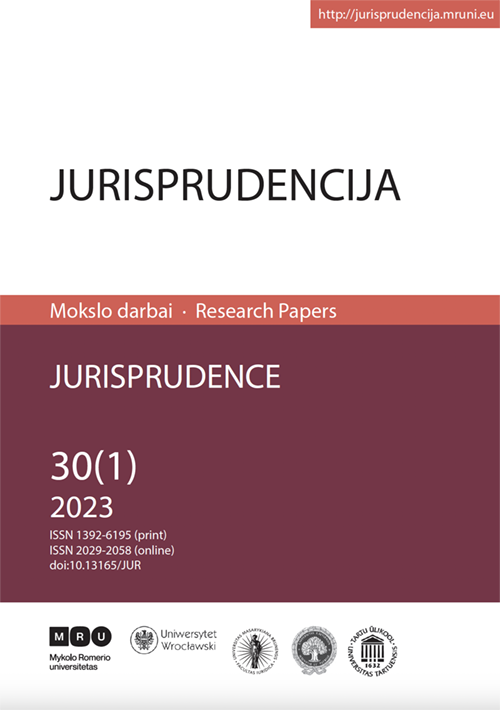TRISDEŠIMT LIETUVOS RESPUBLIKOS KONSTITUCIJOS AIŠKINIMO METŲ: KRYPTYS IR JŲ DINAMIKA
THIRTY YEARS OF THE INTERPRETATION OF THE CONSTITUTION OF THE REPUBLIC OF LITHUANIA: DIRECTIONS AND THEIR DYNAMICS
Author(s): Danutė Jočienė, Lina BeliūnienėSubject(s): Constitutional Law
Published by: Mykolas Romeris University
Keywords: official interpretation of the Constitution; democratic state functioning under the rule of law; constitutional human rights and freedoms;
Summary/Abstract: Based on the presentation delivered by Danutė Jočienė in the international scientific conference on the occasion of the Day of the Constitution in 2022, this article analyses the official interpretation and application of the Constitution of the Republic of Lithuania during the 30 years of the functioning of the Constitutional Court of the Republic of Lithuania. The authors present the three most significant directions (areas) of the interpretative activities of the Court as well as some powerful examples from the official constitutional doctrine widely formed by the Constitutional Court. In this article, the three main directions (or areas) of the official constitutional doctrine are analysed. Firstly, the authors present the official constitutional doctrine reflecting the basis for the functioning of the State of Lithuania and society in general: the understanding of the Constitution as such, the principle of the supremacy of the Constitution, constitutional restrictions for the amendment of the Constitution, the content of the constitutional principles of democracy and rule of law, as well as the constitutional principle of separation of powers. The second direction presented is devoted to the official constitutional doctrine on the constitutional human rights protection system, and the third reflects the official interpretation of the Constitution in light of Lithuania’s international obligations. As regards the constitutional human rights protection system, the Constitutional Court has, among other things, noted that the Constitution is a majoritarian act which protects every individual. The Constitutional Court has clearly recognised in its official constitutional doctrine the natural character of the human rights acquired by every individual by the fact of birth. A lot of attention has been paid to the dignity of a person as a constitutional value. In the third area, the most important principle formed by the Constitutional Court during the years of its activities is the constitutional principle of the Openness of the Lithuanian Constitution to international law, including European Union law. Such a position developed by the Constitutional Court results in the clear legal obligation to the State of Lithuania to implement all international obligations, and reflects the way that the interpretation of the Constitution is being opened up and made friendly towards international and European Union law. The constitutional geopolitical orientation principle of the State of Lithuania, as developed by the Constitutional Court, is also presented and analysed. In this article, a lot of attention is paid to the powers of the Constitutional Court, granted to it under the Constitution, to officially interpret the Constitution and to form the official constitutional doctrine. Such a jurisprudential function of the Constitutional Court is presented in this article as a constant and systemic process which enables the Court to interpret the existing, pre-formed official constitutional doctrine more widely, adding to it new elements when there is an objective constitutional need and (or) legal arguments for such an evolutive interpretation of one or another constitutional provisions. At the same time, the idea of the Constitution as a living instrument (or the dynamic interpretation of the Constitution) is stressed. The authors come to the main conclusion that, in all three directions presented in this article, over the thirty years of its activities the Constitutional Court has formed a wide or mature official constitutional doctrine which will serve as a constitutional basis for the future activities of the Court, and which will remain as a legal basis for the further evolutive interpretation of the Constitution.
Journal: Jurisprudencija
- Issue Year: 30/2023
- Issue No: 1
- Page Range: 6-44
- Page Count: 39
- Language: Lithuanian

